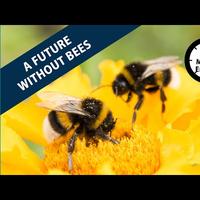Is there a future without bees? - Listen to 6 Minute English - YouTube
Hello. This is 6 Minute English from
BBC Learning English. I'm Neil.
And I'm Sam. How are you, Neil?
I've been as busy as a bee
this week, Sam.
Oh, don't you sound like the bee's knees!
All right, Sam, there's no need
to get a bee in your bonnet!
As you can hear, English is full
of idioms involving bees.
But the sad truth is that bee numbers are
declining at an alarming rate and in some
places disappearing altogether.
And this has serious consequences
for humans.
Today, one third of the food we eat
depends on insects to pollinate crops,
fruit and vegetables.
But bees are in trouble. In some European
countries up to half of all bee species are
facing extinction, placing our
food supply chain at risk.
Bees are vital in pollinating hundreds
of crops, from apples and
blackberries to cucumbers.
In fact, almost all plants need insects to
reproduce - which is my quiz question - of
the world's top 50 crops, how many
rely on insect pollination? Is it:
a) 35 out of 50?, b) 40 out of 50?
or c) 45 out of 50?
I reckon those busy bees pollinate
b) 40 out of 50 of the most
common crops.
OK, Sam, we'll find out the answer later.
Now, if you think back
to your school biology
lessons, you may remember
that plants and flowers contain
both male and female reproductive
parts inside.
But what exactly is going on when bees
pollinate a plant? Here's Claire Bates
from BBC World
Service programme People
Fixing the World to remind us:
What is pollination? All flowering plants
need it to reproduce.
Pollen is moved from
the male part of a flower
to the female part of a flower, then
fertilisation can happen
causing fruit to grow. Some staple crops
such as wheat, rice and
corn are pollinated by
the wind however many plants
don't release their pollen easily
and this is where insects,
and especially bees, come in.
As they collect nectar to eat,
pollen sticks to them and they
carry it from flower to flower.
Pollination is the process in which pollen
is taken from one plant to another so that
it can reproduce. This is the important
work done by bees and insects.
Only after pollination can the next
process occur - fertilisation - when
the pollen carried
from another plant fertilises
a female ovule to make new seeds.
Fertilisation occurs in all flowering plants,
some of which like wheat,
potatoes and rice
are staple crops - food that is eaten
in large amounts as part
of a community's daily diet
and provides a large fraction of their
energy and nutrient needs.
Fewer bees reduces pollination levels,
meaning fewer new seeds
are created and fewer crops
grown.
But it isn't just the decline in bee numbers
causing a problem. Like us,
bees need to rest
and this has led some to come up
with creative new ways
of supplementing bee pollination.
One such innovator is Keren Mimran,
co-founder of agro-tech company,
Edete. Here she is,
explaining how dropping pollen from
drones can pollinate crops,
giving a helping hand
to hard-working bees.
How come our food security is so much
dependent on an insect that
we cannot really control?
We can bring the bees to the orchard
or to a field but we cannot
control their behaviour.
They do not come out of the hive when
it's raining or when there's
heavy wind, they work
only during daytime. There must be
a possibility of developing
a mechanical solution to the
pollination challenge.
Keren Mimran there, speaking on the BBC
World Service programme People Fixing
The World. Bees' behaviour
can't be controlled - when it rains they
won't leave their hive - the structure
where bees
live, either built by people or
made by the bees themselves.
So Keren's company has developed
drones to drop pollen on
her orchard - an area of land
on which fruit trees are grown.
The need for these high-tech solutions
reflects the seriousness
of the pollination problem
for food security - everyone getting
enough affordable and nutritious food
to meet their
daily dietary needs.
I had no idea bees were so important,
Neil. Maybe I underestimated
how hard they work.
Ah, you mean today's quiz question.
I asked you how many of the top
50 world crops rely
on insect pollination.
And I said b) 40 out of 50
of the top crops.
And you are right! They certainly are the
bee's knees when it comes
to pollinating plants!
So in today's programme we've
been hearing about the important role
bees play in pollination
- transferring pollen from plant to plant,
necessary for the
next stage of fertilisation
- producing new seeds and
fruit inside a plant.
Bees and insects play a vital
role in growing the world's
staple crops - food which, eaten
in large amounts, makes up the majority
of a community's daily diet
and meets their nutrient needs.
So bee numbers are directly linked to the
issue of food security - everyone getting
enough affordable,
nutritious food to meet
their dietary needs.
Which explains why, when bees
won't leave their home - or hive - some
people have started
using drones to pollinate their orchards -
land growing fruit trees.
And that's it for this edition of
6 Minute English. Bye for now!
Goodbye!

